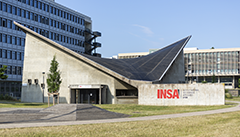
Sciences & Société
Soutenance de thèse : Valentine DELBRUEL
« Use of additive manufacturing for functional rehabilitation »
Doctorant : Valentine DELBRUEL
Laboratoire INSA : MATEIS
École doctorale : ED34 : Matériaux de Lyon
Since 2017, Humanity and Inclusion has used Fused Filament Fabrication (FFF) to produce prosthetics and orthotics in low-income countries. The initial outcomes were promising, but reliance on imported PP filaments from Europe led to logistical issues. This project aims to recycle plastic waste into 3D-printing filament for local orthopedic device manufacturing in Togo. First, a study evaluated PET, PP, and TPU materials based on availability, recyclability, printability, and mechanical properties. PP was selected for its semi-rigidity, ensuring patient comfort and support. Second, the printability and properties of PP-PE blends from recycling plants were studied. Thermal and rheological analyses highlighted the most promising composition for FFF: a PP matrix with 30 to 50% HDPE. Satisfactory mechanical properties were obtained due to in-situ compatibilization during processing. Ultimately, recycled blends with 70% PP – 30% HDPE, sourced from post-consumer waste from food packaging and post-industrial waste from orthopedic sheet production scraps, were transformed into filament and 3D-printed into AFOs through an optimization of the processing parameters. Third, durability assessments examined the accelerated aging resistance of PP under Togo weather conditions. Recycled PP was sensitive to thermo- and photo-oxidation due to impurities and degraded stabilizers. However, 3D-printing limited process-induced degradation, showing promise for aging resistance. Finally, mechanical tests on a walking bench compared 3D- printed AFOs from virgin and recycled materials with thermoformed PP AFO. While the thermoformed AFO showed the highest resistance, 3D-printed AFOs exhibited similar resistance, with virgin AFOs showing ductile rupture and recycled AFOs showing brittle rupture, highlighting the potential of recycled materials. To conclude, the perspectives for humanitarian applications are discussed, emphasizing the potential of emerging techniques such as Fused Granular Fabrication, which could simplify the manufacturing process and reduce costs.
Additional informations
-
Amphithéâtre Gaston Berger, INSA-Lyon (Villeurbanne)

